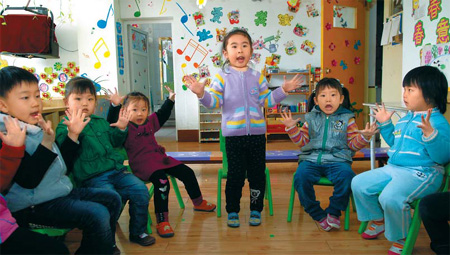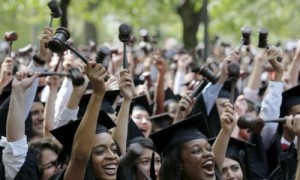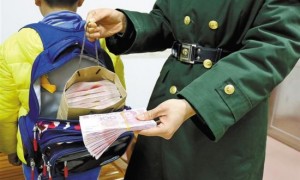 |
Children take part in a music class at Tashan Kindergarten in Yantai city, Shandong province, on Monday. [Photo/Xinhua]
|
BEIJING - Parents are questioning the professionalism of kindergarten teachers after it emerged that more than 90 percent of childcare workers in Jiangsu province are unlicensed.
Chen Lingfu, vice-president of Nanjing Normal University and a member of the Chinese People's Political Consultative Conference National Committee, released the figure during a speech he made on Wednesday.
Chen said the specialization level of kindergarten teachers was low and claimed some teachers were "irresponsible and lacking benevolence".
During the past year, the media has reported several cases of violence perpetrated by kindergarten teachers against children. Incidents included a teacher sticking needles into a child's hands and another burning seven children's faces with an electric iron.
Parents, grandparents and others who care for children said they were worried about Chen's comments.
"I believe the violence is not isolated and I am worried about the quality of kindergartens," said Shen Yin, a 60-year-old Beijing resident who is hesitating about whether or not to send her grandson to kindergarten this autumn.
"If my grandson cannot get a place at a public kindergarten, which would be more reliable than a private one, I might keep him at home and take care of him until he starts regular school at 6," she said.
The country currently has around 60 million children aged between 3 and 6 but State-run kindergartens can only accept about 41 percent of them, Beijing Times reported on Monday.
"By the end of 2010, the government's funding for preschool education was only 1.3 percent of its overall spending on education, which is far behind the average of 10 percent seen in developed countries," Chen said during his speech.
The government has set the goal of increasing the number of children who are enrolled in State-run kindergartens to 40 million by 2020, according to the country's mid- and long-term plans.
However, one education expert said simply increasing investment will not be "enough to make substantial improvements".
According to Liao Liying, secretary-general of the China National Society of Early Childhood Education, the presence of for-profit private-sector kindergartens led to the shortage of qualified staff.
"In my research, I found many kindergartens, especially private ones, hire college interns who are majoring in preschool education," Liao said. "Most interns have only spent half a year at camps and have not taken any specialized courses, and these unprofessional teachers leave the kindergartens after spending three years with them."
She said kindergartens hire interns because they want to keep down their costs. Some interns earn as little as 200 yuan ($30) a month.
"Most kindergartens in Beijing pay less than 2,000 yuan a month for qualified teachers," Liao added. "As a result, many of my students choose not to find work that is relevant to their major after they graduate because the career of a kindergarten teacher does not offer a promising future."
Chen said better wages would lead to better-qualified teachers.
"The government should establish a minimum wage for kindergarten teachers similar to the minimum wage for primary school teachers," he said.
Chen added that the government should attach greater importance to preschool education and clarify the amount of fiscal support for kindergartens that should come from governments of all levels.
Under the law, kindergarten teachers must have graduated from a secondary vocational school or higher-ranked institution with a major in preschool education. They must have also applied for the relevant certificates from the education authorities. In addition, kindergarten teachers must have passed courses in psychology and Mandarin.







